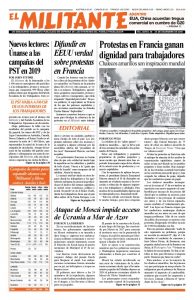Below are excerpts from Lenin’s Final Fight: Speeches and Writings, 1922-1923. The first is a memo by Vladimir Lenin to the political bureau of the All-Russian Communist Party, formerly the Bolshevik Party. From chapter two of the book — “The Fight Opens: the National Question and the Voluntary Union of Soviet Republics” — the memo is entitled, “On Combating Great-Power Chauvinism.” The second selection is from the introduction by Jack Barnes and Steve Clark. Barnes is the national secretary of the Socialist Workers Party and Clark is managing editor of Pathfinder Press.
Lenin was the central leader of the world’s first socialist revolution, the Russian Revolution, from 1917 until his death in January 1924. The book documents what was to be his last political battle in 1922-23. At stake was whether that revolution would remain on the proletarian course that had brought workers and peasants to power, sweeping aside the former czarist empire in 1917.
One of the central issues was Lenin’s fight to win the leadership of the party to defend the right of oppressed nations to self-determination and equality, ensuring a voluntary union of Soviet republics.
Lenin’s note below proposes a measure to resist the encroaching influence of the Great Russian bureaucracy. Lenin also supported language-rights movements in the oppressed nations and nationalities, such as the Ukrainization of Ukraine, to advance equal status between the Soviet Republics. After Lenin’s death, Joseph Stalin consolidated power at the head of a bloody political counterrevolution that reversed Lenin’s course of proletarian internationalism. Copyright © 1995 by Pathfinder Press. Reprinted by permission.
❖
Memo to the Political Bureau
October 6, 1922
I declare war to the death on Great Russian chauvinism. I shall eat it with all my healthy teeth as soon as I get rid of this accursed bad tooth. It must be absolutely insisted that the union Central Executive Committee should be presided over in turn by a Russian,
Ukrainian,
Georgian, etc.
Absolutely!
Yours,
Lenin
***
AND STEVE CLARK
The Soviet congress in January 1918 established the Russian Soviet Federated Socialist Republic (RSFSR) “leaving it to the workers and peasants of each nation to decide independently at their own authoritative congress of soviets whether they wish to participate in the federal government. . . and on what terms.”
By late 1922, twenty-one autonomous republics and regions had been established within the RSFSR itself, and the revolutionary government was collaborating with soviet republics in Armenia, Azerbaijan, Belorussia, Georgia, and Ukraine to form what in December 1922 would become the Union of Soviet Socialist Republics (USSR). Lenin, however, objected to Stalin’s initial draft of a Central Committee resolution, which negated the Bolsheviks’ long-standing proletarian internationalism by calling for “entry” of these other republics into the Russian federation.
“We consider ourselves, the Ukrainian SSR, and others equal,” Lenin wrote in a September 1922 letter to the party’s Political Bureau, and “enter with them on an equal basis into a new union, a new federation, the Union of the Soviet Republics of Europe and Asia.”
In a note to the Political Bureau the following day, Stalin acquiesced to an amended form of this proposal and several other of “Comrade Lenin’s unimportant amendments,” as he called them. Stalin’s note dismissively referred to Lenin’s uncompromising opposition to Great Russian chauvinism as the “national liberalism of Comrade Lenin.”
Two months later Lenin was outraged to discover that Central Committee member Grigory Ordzhonikidze, in the presence of another CC member, Aleksey Rykov, had physically struck a Communist from Georgia during a dispute over national rights. In Lenin’s late December letter to the upcoming party congress, he wrote that the Bolsheviks’ support for the right of national self-determination “will be a mere scrap of paper” if the party is “unable to defend the non-Russians from the onslaught of that really Russian man, the Great Russian chauvinist, in substance a scoundrel and a tyrant, such as the typical Russian bureaucrat is.”
And Lenin concluded: “That is why internationalism on the part of oppressors or ‘great’ nations, as they are called (though they are great only in their violence, only great as bullies), must consist not only in the observance of the formal equality of nations but even in an inequality, through which the oppressor nation, the great nation, would compensate for the inequality which obtains in real life. Anybody who does not understand this has not grasped the real proletarian attitude to the national question; he is still essentially petty bourgeois in his point of view and is, therefore, sure to descend to the bourgeois point of view.”
In early March 1923, Lenin, who knew he was too ill to attend the upcoming Central Committee meeting later that month, wrote Trotsky with an “earnest request that you should undertake the defense of the Georgian case in the party CC. This case is now under ‘persecution’ by Stalin and [Feliks] Dzerzhinsky, and I cannot rely on their impartiality.” Trotsky did so but, as recorded later in these pages, the motion he placed before the Central Committee was defeated.


